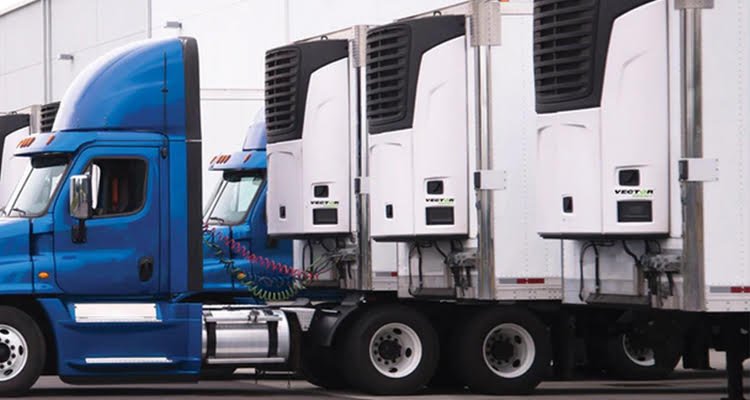Reefer repair and Lanham regulations may not be the most exciting topics, but they’re crucial in the world of transportation and logistics. Reefer repair refers to the maintenance and servicing of refrigerated trailers, which are vital for transporting temperature-sensitive goods. On the other hand, Lanham regulations, named after the Lanham Act, govern trademark and false advertising laws in the United States. While these subjects might seem unrelated, they intersect when it comes to the branding and marketing of reefer repair services. In this brief, Go-go Logistics & Transport Services LLC will explore the importance of complying with Lanham regulations in the reefer repair industry and why it matters to both service providers and their clients.
Intellectual Property Protection:
Intellectual property protection is like a shield for creative minds and innovative businesses, including those in the reefer repair industry. It’s all about safeguarding your original ideas, inventions, and branding from being used or replicated without your permission. Think of it as the legal armor that shields your hard work and investments from being unfairly taken by others. This protection covers a broad spectrum, from trademarks and patents to copyrights and trade secrets. For example, when you create a catchy logo or slogan for your reefer repair business, it’s your intellectual property, and you have the right to prevent others from using it without your consent. By understanding and utilizing intellectual property protection, you’re not only safeguarding your creations but also fostering innovation and creativity in your industry. It’s a fundamental aspect of modern business that ensures fair competition and rewards those who invest in new ideas and services.
Protecting Brand Reputation:
Protecting your brand reputation is like nurturing the trust and credibility you’ve built in the eyes of your customers. It’s about ensuring that your reefer repair business maintains a positive image, which can significantly impact your success. When you consistently deliver quality service, maintain honesty in your advertising, and stand by your promises, you’re not just providing excellent service, but you’re also safeguarding your brand’s integrity. A strong reputation can be your most valuable asset, attracting new clients and retaining loyal ones. On the flip side, a tarnished reputation can have detrimental effects, eroding trust and driving customers away. By prioritizing brand reputation, you’re investing in the long-term success and sustainability of your business, ensuring that your clients continue to see you as a reliable and trustworthy partner in their transportation and logistics needs.
Resolving Disputes:
Resolving disputes, in the world of reefer repair such as diagnosing and fixing reefer truck refrigeration unit noise, and beyond, is a bit like being the peacemaker in a disagreement. It’s all about finding solutions to conflicts and disagreements through a structured and fair process. In the context of reefer repair, this might mean resolving issues between customers and service providers, whether it’s over service quality, pricing, or contract terms. It’s important because disputes, if left unresolved, can lead to legal battles and damage your business’s reputation. By having clear policies and procedures in place for resolving disputes, you not only protect your own interests but also demonstrate your commitment to customer satisfaction. Effective dispute resolution can save time, money, and relationships, ensuring that both parties walk away with a sense of fairness and, hopefully, a resolution that benefits everyone.

Comparative Advertising:
- What is Comparative Advertising?
- Comparative advertising is a marketing strategy where a business directly compares its product or service to that of a competitor.
- Highlighting Advantages:
- It’s all about showcasing your strengths and advantages over competitors to attract potential customers.
- Transparency in Marketing:
- Comparative advertising can be a way to promote transparency in the market by providing consumers with information to make informed choices.
- Legal Boundaries:
- However, it’s essential to stay within legal boundaries to avoid making false claims or misleading statements.
- Benefits for Consumers:
- It can benefit consumers by offering a clear comparison of products or services, helping them make better purchasing decisions.
- Avoiding Deception:
- Businesses must ensure that the comparisons are accurate and not deceptive or unfairly biased.
- Emphasizing Differences:
- Comparative advertising can emphasize differences in price, quality, features, or other attributes between products or services.
- Staying Ethical:
- Maintaining ethical standards in comparative advertising is crucial to avoid harming competitors’ reputations or facing legal challenges.
- Legal Implications:
- Laws vary by country, so it’s important to understand the legal implications and regulations specific to your region.
- Consumer Perception:
- How consumers perceive your comparative advertising can influence their perception of your brand and your competitors.
- Research and Data:
- To execute effective comparative advertising, you need accurate data and research to support your claims.
- Balanced Messaging:
- Balancing the message between what you do better and what your competitor does well is a key aspect of effective comparative advertising.
- Competitor Response:
- Be prepared for your competitors to respond with their own comparative advertising or legal actions if they believe your claims are unfair or untrue.
Consumer Protection:
Consumer protection, such as tips for identifying and fixing reefer unit condenser coil clogs, is like having a guardian angel when you’re out shopping or seeking services. It’s all about ensuring that as a customer, you’re treated fairly, honestly, and with respect. Think of it as a safety net that prevents businesses from taking advantage of you. In the context of reefer repair, it means you have the right to receive accurate information about the services, pricing, and quality you’re paying for. This protection extends to a wide range of industries, from food safety to product warranties. When businesses adhere to consumer protection laws and regulations, they help build trust with their customers, knowing they won’t be tricked or deceived. It’s an essential element in modern commerce, promoting ethical behavior and ensuring that the interests of the consumer are safeguarded, ultimately leading to a fair and transparent marketplace.

Benefits of Trademark Registration:
Trademark registration is like giving your brand a unique identity card in the business world. It’s all about securing exclusive rights to your brand name, logo, or slogan, making sure no one else can use it without your permission. Think of it as a protective shield for your brand’s reputation. When you register your trademark, you gain legal ownership and the ability to take legal action against anyone who tries to imitate or misuse it. This offers several benefits, including enhanced brand recognition, a competitive edge in the market, and a solid legal foundation for protecting your intellectual property. It’s an investment that not only safeguards your brand but also adds significant value to your business, as customers come to recognize and trust your unique identity.
Legal Defenses:
Legal defenses are like the tools in a lawyer’s arsenal, designed to protect your rights and interests when you’re facing legal challenges. In the context of reefer repair or any other business, legal defenses are strategies and arguments used to counter allegations, claims, or charges brought against you. Think of them as your shield and sword in the courtroom. They can include evidence, witnesses, and well-structured arguments to prove your innocence or counter the accusations. Legal defenses are vital to ensuring a fair legal process and protecting your rights. They can be your best line of defense in various situations, from contract disputes to intellectual property issues, helping you navigate the complexities of the legal system and work towards a just resolution.
Market Competition:
Market competition, such as preventing reefer unit breakdowns on the road, is like the heartbeat of a dynamic economy, where businesses strive to outdo each other to win the favor of customers. It’s the driving force that encourages companies to innovate, provide better services, and keep prices competitive. In the world of reefer repair, competition among service providers pushes them to offer top-notch service quality and maintain fair pricing, ultimately benefiting the customers. It’s a bit like a sports match where different teams (or businesses) aim to excel and deliver their best performance. Market competition is what keeps businesses on their toes, spurring them to improve and stay relevant. As consumers, this competition is a win-win, offering us a variety of choices and pushing companies to continually raise the bar in terms of value and service quality.

Legal Consultation:
Legal consultation is like seeking guidance from a seasoned navigator when you’re sailing in uncharted waters. It’s all about turning to experts in the legal field for advice and support when you encounter complex legal issues or need to make critical decisions. In the context of reefer repair or any business, legal consultation can be your compass in the intricate world of laws and regulations. Whether you’re dealing with contracts, intellectual property, or disputes, consulting with legal experts provides valuable insights, helping you make informed choices and avoid potential legal pitfalls. It’s a bit like having a trusted co-pilot to guide you through legal turbulence, ensuring you stay on the right course while minimizing risks and liabilities. Legal consultation isn’t just about solving problems; it’s also about proactive risk management, keeping your business sailing smoothly in a sometimes turbulent sea of laws and regulations.
FAQ’s:
How does a reefer work?
A reefer, short for refrigerated container, works by maintaining a controlled temperature inside to preserve the freshness and quality of perishable goods during transportation.
How long does a reefer trailer last?
The lifespan of a reefer trailer can vary, but with proper maintenance, it can last for about 10 to 15 years or more.
What is the temperature range of a reefer?
A reefer can typically maintain temperatures ranging from -20 degrees Fahrenheit (-29 degrees Celsius) to 80 degrees Fahrenheit (27 degrees Celsius) or more, depending on the specific model and requirements.
How do you maintain a reefer?
Proper reefer maintenance involves routine checks of the refrigeration unit, cleaning, and ensuring airtight seals to prevent temperature fluctuations, and conducting regular servicing by trained technicians.
How often should a reefer be serviced?
A reefer should typically be serviced every 1,000 to 2,000 operating hours or at least once a year to ensure optimal performance and reliability.
CONCLUSION:
In conclusion, the world of reefer repair intersects with the vital realm of Lanham Regulations, which govern trademark and false advertising laws. Ensuring compliance with these regulations is not just a legal obligation; it’s a commitment to ethical business practices and consumer trust. By embracing these guidelines, reefer repair businesses can safeguard their reputation, foster fair competition, and ultimately provide better services to their clients. It’s a journey toward a transparent and trustworthy marketplace where everyone benefits, and it’s a path well worth taking in the world of transportation and logistics.